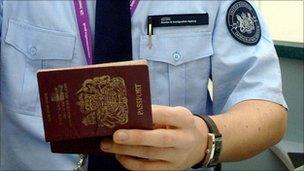Education leaders unite against student visa cuts plan
- Published

The government wants to cut net migration from 200,000 to under 100,000 by 2015
Leading figures in higher education have attacked government plans to limit UK visas for international students.
The vice-chancellors' body Universities UK described them as "damaging and dangerous", while one university head said they could be "catastrophic".
The government is currently consulting on plans to cut visas, external for students studying below degree level and to raise English language requirements.
It says the system is abused and net migration needs to be reduced.
The proposals relate to prospective students from outside the EU applying for visas under what is known as Tier 4 of the points-based system.
These accounted for about two-thirds of the 273,000 visas issued to students to come to the UK in 2009.
The government wants to reduce the number of visas granted to such applicants wanting to study at courses below degree level, and to require a higher standard of English for those who do come.
It has pledged to reduce net migration from its current 215,000 to less than 100,000 by 2015.
But universities argue that many international degree students are recruited from non-degree courses, on which they have improved their English and increased their subject knowledge.
And Universities UK says that international students provide about 9% of the sector's income.
Edward Action, Vice Chancellor of East Anglia University, said that if the language requirement was raised, "the catastrophic effects on universities will, for a period, actually make the home [tuition] fees matter slightly fade from the centre, so grave will it be".
Nicola Dandridge, chief executive of Universities UK, said of the proposals: "They're damaging, they're dangerous and we are very opposed and very concerned about them."
'Absolute travesty'
Tony Milns, chief executive of the English language teaching association English UK, estimated that the planned raising of the required language level would rule out 70-80% of students who currently study foundation courses.
He said universities recruit nearly half of their international students from such courses.
"International student fees subsidise home student places, they keep courses and sometimes whole departments open. In some universities, where more than 60% of students are not home students, they are vital to the survival of institutions," he said.
The proposed changes come as tuition fees for students in England are set to rise in 2012 from just over £3,000 to up to £9,000, alongside cuts to teaching budgets.
This year, before the increased fees are brought in, universities in England face a 6% cut to teaching budgets, as well as cuts of 54% to capital funding related to teaching.
The president of the National Union of Students, Aaron Porter, said home students would lose out in terms of the cultural and academic environment if the number of international students were to drop.
He raised concerns about the effect on some institutions, such as the London School of Economics, in which 70% of students come from an international background.
"It would be an absolute travesty at a time when universities and students are facing unprecedented challenges for an additional, unnecessary and indeed economically counter-productive challenge to be thrown into the mix," he said.
Immigration Minister Damian Green said the government believed that attracting talented students from abroad was vital to the UK, "but we must be more selective about who can come here and how long they can stay".
The Home Office estimates that 14% of language school students on Tier 4 visas, and 26% studying in private institutions are breaking immigration rules.
It says it is concerned that some non-degree courses are used as a pretext to enable the student to enter the UK in the hope of living and working there.
A Home Office analysis found that 20% of people who were granted student visas in 2004 were still in the UK in 2009.
It also said 13% of people were granted permission to settle in the UK in 2009 had entered the UK on a study visa.
"Too many individuals applying to study at below degree level have been coming here to live and work instead. We need to stop this abuse," Mr Green said.
He said the government was listening to the views of the education sector in its consultation, which ends on 31 January.
"The proposals follow a major review of the system, and are aimed at a more selective system and, crucially, reducing the numbers to meet the Government's target of reducing net migration to sustainable levels," a Home Office spokesperson told the BBC last week.
The government also wants to introduce measures to ensure students return home following their studies.